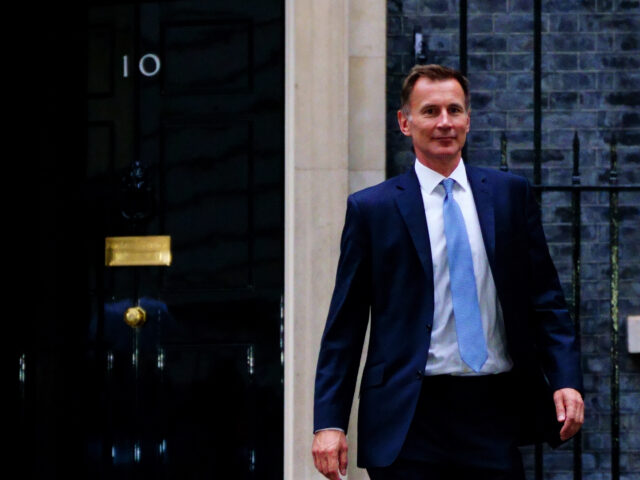Newly installed Chancellor of the Exchequer Jeremy Hunt has confirmed that once again a Conservative government will raise taxes, signalling a potential death blow to the prospect of Prime Minister Liz Truss governing as a Thatcherite.
Doing the rounds on the Saturday morning media circuit, Jeremy Hunt, who has become perhaps the most powerful politician in the country after Liz Truss was was forced by parliamentary party pressure into sacking her chief ally, former Chancellor Kwasi Kwarteng, said that “mistakes” were made in pursuing tax cuts.
“It was a mistake when we were going to be asking for difficult decisions across the board on tax and spending to cut the rate of tax paid by the very wealthiest,” the new Chancellor, who is one of the richest politicians in the House of Commons told the BBC.
Appearing on Sky News, Hunt went on to say: “Taxes are not going to come down by as much as people hoped, and some taxes will have to go up.
“If we’re going to fund the NHS and our public services and keep taxes down we have to solve the growth paradox,” he said. “The way we went about it clearly wasn’t right and that’s why I’m sitting here now.”
"There were some mistakes made in the last few weeks, that's why I'm sitting here"
Chancellor Jeremy Hunt says mistakes have been "addressed" and the UK government aims to "create growth with stability"https://t.co/i7kfESrYT8 pic.twitter.com/FIELDaFIkq
— BBC News (UK) (@BBCNews) October 15, 2022
After an embarrassing U-turn last month on her plan to abolish the top 45 per cent tax rate of income tax on earnings above £150,000 ($168,000), and after facing significant pressure from within her own party, central bankers, the establishment media, and left-wing forces, Prime Minister Liz Truss announced on Friday that she would also reverse her and Kwarteng’s plan to scrap a planned rise in corporation tax from 19 per cent to 25 per cent.
Hunt said that his predecessor, who only lasted 38 days in office, had made “two mistakes”, saying that it “was wrong” to have committed to cutting the top income tax rate and it was also “wrong to fly blind” in announcing financial plans without having secured advice from the independent Office for Budget Responsibility (OBR) in order to shore up confidence in the markets.
The new Chancellor, an anti-Brexit, pro-lockdown politician with personal links to China, rejected by his party’s ordinary members by a landslide when he challenged Boris Johnson for the party leadership in 2019, also said that he would not make any “specific commitments” on other tax hikes or spending cuts.
“We have to make sure as we take these very difficult decisions, we’re honest with people about the situation we face,” he claimed.
Anti-Brexit, China-Linked Covid Authoritarian Jeremy Hunt Becomes UK Chancellorhttps://t.co/r6APvnbsMc
— Breitbart London (@BreitbartLondon) October 14, 2022
During the leadership contest to replace Boris Johnson, Liz Truss won the vote among Conservative party members against former Chancellor Rishi Sunak by a margin of 57 to 42 per cent after attempting to cast herself as the heir apparent to Margaret Thatcher, even going so far as to wear the same outfits as the late Tory PM.
The campaign was largely fought over the issue of taxation, with Truss arguing that tax cuts were essential for the economic growth needed to avert an economic collapse.
Sunak, who as Johnson’s chancellor had helped increase the tax burden to its heaviest in 70 years, argued that further tax hikes were necessary in order to mitigate the debt incurred during the Chinese coronavirus lockdowns, which were cheered on by figures such as Hunt.
While Truss’s platform was supported by the Conservative Party membership, during the initial rounds of the leadership contest, which were decided by a series of votes by Tory MPs, Suank secured the most votes from his colleagues, making it difficult for Truss to actually govern in the House of Commons.
Hunt, despite his appointment as Chancellor signalling he remains an influential figure among the party establishment, did not make it out of the opening stages of the leadership contest in 2022, despite making the final two in 2019 — and he backed Sunak, not Truss, for party leader.
“The sustained tax burden is now the highest it’s been since the country was recovering from the Second World War 70 years ago, and any tax rises in the next Budget will put that figure even higher." https://t.co/re0wyyLGPy
— Breitbart London (@BreitbartLondon) February 1, 2021
Though the Conservatives have traditionally been considered the low-tax party in Britain, the government of Boris Johnson ushered in the highest tax burden in 70 years. This comes despite the 2019 Conservative manifesto — upon which this current government was elected — that pledged that “Conservatives want to give you freedom – low taxes, opportunity, the chance to realise your dreams.”
Since coming into power in 2010, the Conservatives have actually raised taxes over 1,000 times.
The U-turn on her central platform does not bode well for the future of Truss’s premiership, which was already on shaky ground given that she was installed as PM without facing the voting public in a general election.
There are already rumours swirling around Westminster that Tory MPs are conspiring to oust Truss just a little over a month after she ascended to Number 10, with it being likely that they would “coronate” a replacement themselves, without giving ordinary party members an opportunity to vote for their preferred candidate this time.
It is unclear if her removal would do much to save the floundering party, however, with the left-wing Labour Party currently holding a 30-plus point advantage in general voting intentions.
Meet the New Boss, Same as the Old Boss: Liz Truss Will Be Next Prime Minister of the United Kingdom https://t.co/RW30W3CQnh
— Breitbart London (@BreitbartLondon) September 5, 2022
Follow Kurt Zindulka on Twitter here @KurtZindulka

COMMENTS
Please let us know if you're having issues with commenting.